新概念英语第一册56课讲义
新概念英语第一册L56
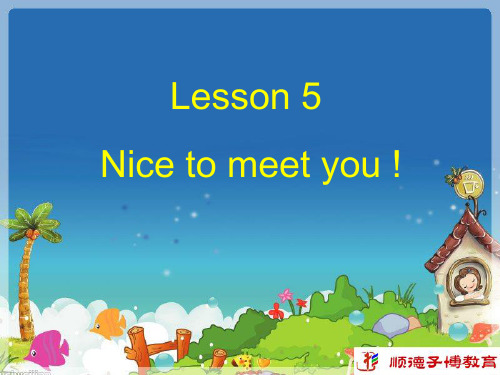
3
Ja panese
German
4
Korean Italian
5
American
English
6
• 先来听懂询问国籍的问题并回答 • What nationality are you ? • I am Chinese. • I’m Chinese .
7
如何询问“他”“她”的国籍呢
19
重点解析 2. he, she, it 的用法
Sophie is a new student. She is French. This is Hans. He is German.
Japanese car.
20
重点解析 3. 冠词 a , an 的用法:
fourteen eighteen
fifteen
nineteen
sixteen
twenty 24
Swedish
What make is the car? It’s a Volvo. It’s a Swedish car.
25
French
What make is the car? It’s a Peugeot. It’s a French car.
Swedish
French
German
Japanese34
Is Fiat a Chinese car or an Italian car? It’s a Chinese car.
35
Hans Chang-woo Luming Xiaohui
German
Korean
Chinese Chinese
Is Sophie a French student or a German student ? She’s a French student. She’s not a German student.
新概念英语第一册第55-56课件(共25张PPT)
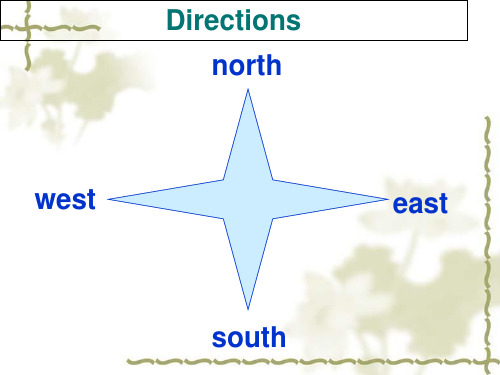
表述客观规律或事实用一般现在时
The plane can fly in the sky. The earth goes around the sun. The book is yellow. He is tall. He is very smart! She is very beautiful!
谢谢观赏
You made my day!
我们,还在路上……
What do you usually do in the weekend? in your vacation?
Do some exercises: 1. ( c ) I often _____ up at 7:oo in the morning. My mother often
_____up at 6:30. A. get, get B. gets, gets C. get, gets D. gets, get 2. (B )Jim’s brother ____ in a factory. He usually _____ to work by car. A. work, go B. works, goes C. works, go D. work, goes 3. (A) ____ you always ____ basketball on Sundays? A. Do, play B. Does, play C. Are, playing D. Are, play 4. (D) _____ your father often____ TV in the evening?
Does she often do her homework at night?
Lesson 56 What do they usually do?
新概念英语第一册Lesson56Nicetomeetyou小学英语英语全国通用

Language Point
语句讲解、课文讲解
同学们 , 请对照教材听老师讲解!
evening : 往往指下班后进入黑天及以后的一段时间 , 即可以有大型公众party或活动的时段。
night : 往往指下班后进入黑天及以后的一段时间 , 看电视 , 聊天或者准备睡觉了。
注意 : 如果在晚上(night)的时间段碰到人 , 要打招呼 , 依旧应该使用Goodevening.
同学们 , 请对照教材听老师讲解!
good morning : 打招呼的方式 早上好 当爆破音如/t/,/d/出现在鼻音/m/, /n/之前发生不完全爆破 , 除了口型做阻碍 , 还要微微发音。 注意和handbag区分 good : adj. 好 morning : n. 早上
同学们,想一想”下午好、 晚上好”该怎么说呢?
Here is : 缩写Here's e.g. 这是我的一套衣服。
一套衣服 : suit <西装 , 西服> Here's my suit.
Vocabulary
词汇精讲
Mr.
student
同学们 , 请对照表格 , 朗读— 下学过的单词。
做个小练习 巩固一下吧~
Language Point
语句讲解、课文讲解
Japanese Swedish
Korean English
Chinese
e.g. 我是中国人。 主语 : 第一人称I 系动词 : am 表语 : Chinese
人称代词(单数) :
I
Be动词
am
you
he , she , it
are
is
I am பைடு நூலகம்hinese.
新概念英语第一册第56课课件.ppt

瑞典的 法国的
德国的 日本的
韩国的 英国的
美国的 意大利的
如何询问汽车的品牌呢?
• What make is the car ? • It’s a German car .
• What make is his / her / your car ? • It’s an American car .
• nice
adj.
美好的
• meet
v.
遇见
• Japanese adj.&n. 日本人
• Korean adj.&n. 韩国人
• Chinese adj&n. 中国人
• too
adv.
也
如何表明国籍呢?
• I am French/German/Japanese/Korean.
• He/She is Chinese/Japanese/German.
NAOKO:
Nice to meet you.
MR. BLAKE: And this is Chang-woo. He's Korean.
CHANG-WOO:Nice to meet you.
MR. BLAKE: And this is Luming. He is Chinese.
LUMNቤተ መጻሕፍቲ ባይዱ:
Nice to meet you.
New Concept EnglishⅠ First Things Frist
Zoe
Everyday English
1.Follow me! 跟我来!/跟着我!
2. Take it easy. 放松点!/慢慢来!
3. Have a try! 试一下!
新概念英语第一册第56课件ppt

• 这句话中的make是名词词性,意思是 产品牌号。 所以这句话的意思是:它是什么牌子 的? 回答:It's a...
• 这句话中的it是代词,这个位置也可以 用其他的名词 例如:What make is this pen?
为深入学习习近平新时代中国特色社 会主义 思想和 党的十 九大精 神,贯彻 全国教 育大会 精神,充 分发挥 中小学 图书室 育人功 能
作业
• 背诵第五课课文,并继续熟练第一课 和第三课的背诵。
• 听写单词。 • 熟练运用本节课所讲解的日常用语。
• suit
n.
school
n.
• teacher
n.
• son
n.
daughter n.
•伞 •请 • 这里 •票 • 号码 • 对不起的 • 先生 • 衣帽间 • 一套衣服 • 学校 • 老师 • 儿子 • 女儿
为深入学习习近平新时代中国特色社 会主义 思想和 党的十 九大精 神,贯彻 全国教 育大会 精神,充 分发挥 中小学 图书室 育人功 能
• ③ adj. 使人高兴的,令人愉快的 It is so nice to have you here.
为深入学习习近平新时代中国特色社 会主义 思想和 党的十 九大精 神,贯彻 全国教 育大会 精神,充 分发挥 中小学 图书室 育人功 能
Nice to meet you!
• 在初次见面时可以说这句话,回答是: Nice to meet you,too.
选择疑问句
• 在两者或三者中进行选择,在一般疑 问句后用or进行连接。
• 选择疑问句词调一般是前升后降。 • 回答必须要用完整的句子回答。
例如:-Is she a teacher or a worker?
裕兴新概念英语第一册笔记:Lesson56Whatdotheyusuallydo
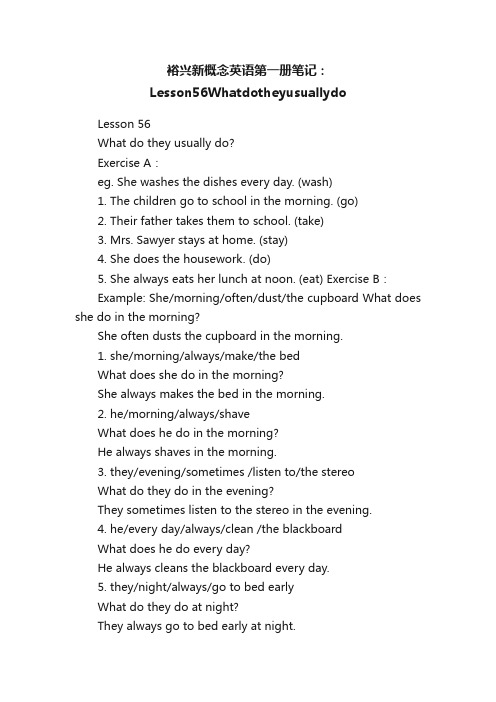
裕兴新概念英语第一册笔记:Lesson56WhatdotheyusuallydoLesson 56What do they usually do?Exercise A:eg. She washes the dishes every day. (wash)1. The children go to school in the morning. (go)2. Their father takes them to school. (take)3. Mrs. Sawyer stays at home. (stay)4. She does the housework. (do)5. She always eats her lunch at noon. (eat) Exercise B:Example: She/morning/often/dust/the cupboard What does she do in the morning?She often dusts the cupboard in the morning.1. she/morning/always/make/the bedWhat does she do in the morning?She always makes the bed in the morning.2. he/morning/always/shaveWhat does he do in the morning?He always shaves in the morning.3. they/evening/sometimes /listen to/the stereoWhat do they do in the evening?They sometimes listen to the stereo in the evening.4. he/every day/always/clean /the blackboardWhat does he do every day?He always cleans the blackboard every day.5. they/night/always/go to bed earlyWhat do they do at night?They always go to bed early at night.6. she/every day/usually/wash /the dishesWhat does she do every day?She usually washes the dishes every day.7. they/afternoon/usually/type/some lettersWhat do they do in the afternoon?They usually type some letters in the afternoon.8. it/every day/usually/think /some milkWhat does it do every day?It usually drinks some milk every day.9. they/evening/sometimes/watch /televisionWhat do they do in the evening?They sometimes watch television in the evening.10.she/noon/always/cat/her lunchWhat does she do at noon?She always cats her lunch at noon.11.he/evening/often/read/his newspaperWhat does he do in the evening?He often reads his newspaper in the evening.小结:一般现在时一般现在时用于表示一个习惯动作,有规律的行为以及永恒的现象。
新概念第一册56课

牌号 瑞典的 英国的 美国的 意大利的 沃尔沃 标致 梅赛德斯 丰田 大宇
make Swedish English American Italian Volvo Peugeot Mercedes Toyota Daewoo
迷你 福特 菲亚特
Mini Ford Fiat
选择疑问句 Is it …… or ……..?
不定冠词a和an的用法区别 冠词分为不定冠词a/an和定冠词the. 不定冠词a和an的区别 an用于元音音标开头的单词前,如 an umbrella a用于辅音音标或半元音音标开头的 单词前,如 a nice handbag
What’s this? This is an ear
[ iə ]
This is hair
This is a foot
[u]
用a或an完成句子 1 Bob is eating ______ an apple. a 2 Tom is eating _______banana. 3 Alice works in _______office. an 4 I have ________ an idea. 5 I have _________ good idea. a 6 Sue is talking to _____ a man. 7 I need to see _____ a doctor. 8 Cuba is ______ an island. 9 Mary is reading ______ an article.
先生 Mr. good 好 早晨 morning Miss 小姐 新的 new 学生 student 法国的,法国人 French 德国的,德国人 German 美好的 nice 遇见 meet
新概念英语第一册55-56课详解

新概念英语第一册55-56课详解Lesson 55-56 of New Concept English Book 1 Detailed Explanation.Lesson 55: The Sawyer Family.Vocabulary and Expressions:live [lɪv] v.: This verb has multiple meanings. Firstly, it can mean to reside or habitually inhabit a place. For example, "I live in Hefei." Secondly, it can mean to exist or be alive, as in "People cannot live without air." Lastly, it can be used in the expression "live a/an... life" to describe the way someone lives their life.stay [steɪ] v.: This Verb primarily means to remain in a place for a period of time. It can also be used figuratively to mean "remain" in a certain state or condition, as in "stay hungry, stay foolish."home [həʊm] n./adv.: As a noun, it refers to the place where one lives. As an adverb, it means "to the place where one lives," as in "go home."housework ['haʊswɜːk] n.: This noun refers to the tasks related to maintaining a household, such as cleaning, cooking, and laundry.lunch [lʌnʃ] n.: This noun refers to the meal eaten in the middle of the day.afternoon [ɑːftə'nuːn] n.: This noun refers to the period of time between noon and evening.Text Explanation:Lesson 55 introduces the Sawyer family and their daily routine. The lesson begins by introducing the family members and their occupations. Mr. Sawyer works in an office, while Mrs. Sawyer stays at home. The children go to school. The lesson then goes on to describe their eveningactivities. Mr. Sawyer usually arrives home from work at about five o'clock, and the family then has their lunch together. In the afternoon, they often have a rest, andthen in the evening, they usually stay at home and watch television.Grammar Points:The use of "-s" or "-es" to form the third-person singular present tense of verbs is reinforced in this lesson. For example, "Mr. Sawyer usually arrives home from work at about five o'clock."The use of prepositions with "live" is also introduced. For example, "Mr. Sawyer lives in a town near London,"where "in" is used with a large place, and "Mrs. Sawyerlives at 87 King Street," where "at" is used with aspecific address.Lesson 56: What Do They Do?Vocabulary and Expressions:together [tə'geðə] adv.: This adverb means "in a group" or "side by side."evening ['iːvnɪŋ] n.: This noun refers to the time of day that comes after afternoon and before night.arrive [ə'raɪv] v.: This Verb means to reach a destination after a journey.night [naɪt] n.: This noun refers to the period of time from sunset to sunrise.Text Explanation:Lesson 56 continues the theme of the Sawyer family's daily life by asking the question, "What do they do?" The lesson provides information about the family's evening activities. Mr. Sawyer usually arrives home from work at about five o'clock, and then the family has their tea together. After tea, they usually sit in the living room and watch television. Sometimes, they go to the cinema orto the theater. On Sundays, they often go for a walk in the park.Grammar Points:The present tense of verbs is reinforced in this lesson, particularly the use of the third-person singular form.The lesson also introduces the use of modal verbs such as "can" and "usually" to express ability and frequency.Conclusion:Lessons 55 and 56 of New Concept English Book 1 focus on the Sawyer family's daily routine and activities. These lessons introduce new vocabulary and expressions related to family life, daily activities, and grammar points such as the use of "-s" or "-es" in the third-person singular present tense and the use of modal verbs. By learning these lessons, students can improve their understanding of family life in English-speaking countries and enhance theirlanguage skills in areas such as vocabulary, grammar, and comprehension.。
新概念第一册56课 PPT课件

• Mr. 先生
Mr.用于男士的姓之前,不能单独使用,如课文 中的 Mr.Blake;而sir 一般单独使用,是对长者、 上司或男顾客的尊称,如:Sorry, sir. 对不起, 先生。
• Miss 小姐 一般用于指未婚女子,不过有时在不知道 对方是否已婚时也可使用.
26
不定冠词a
6
• French [frentʃ] adj.&n. 法国人 • German ['dʒə:mən] adj.&n. 德国人 • nice ['nais] adj. 美好的 • meet [mi:t] v. 遇见 • Japanese [ˌdʒæpə'ni:z] adj.&n. 日本人 • Korean [kə'riən] adj.&n. 韩国人 • Chinese [ˌtʃai'ni:z] adj&n. 中国人 • too [tu:] adv. 也
• 冠词数量上表示“一个”。冠词一共有 三个,分为不定冠词(a,an)和定冠 词(the)。
• 可数名词单数前面必须要用不定冠词。 a用在以辅音音素开头的名词前面 an 用于以元音开头的名词前面 例如:a pen an apple an umbrella an egg an hour a shirt
• ② adj. 和蔼的,友好的 He is very nice to his neighbours.
2. --Is this your umbrella? -- No, it D____ .
A. is B. not is C. my D. isn’t
3. – What is your name? –Pardon? --_A____
新概念英语第一册_55_56课课件

eg :My best friend and I live together. eg :We sometimes drink coffee together.
evening n. 晚上
一般指下午以后和上床睡觉前 这段时间比night的时间要早。 night 一般指夜里
night n. 夜间
good night 晚安 at night 在夜里 all night along 一整夜
arrive v. 到达
arrive in 后面一般接城市或国家 arrive in France arrive 后面可直接加副词 arrive here arrive there arrive home arrive at 后面接的地点,一 般是公共场所或某座大楼。 arrive at the hotel
sework n. 家务 h n. 午饭 ernoon n. 下午
usually adv. 通常 together adv. 一起 evening n. 晚上 arrive v. 到达 night n. 夜间
live v. 住,生活(是指长久的居住,住在自己家中)
eg: where do you live ? 你住在哪里?
reads her
milk
eats her lunch newspaper
Bye---bye!
知识回顾 Knowledge Review
—I usually play on the computer.
dusts the makes the cupboard bed
shaves
listen
cleans the go to bed blackboard
新概念第一册56课课件PPT课件

2021/7/23
第27页/共40页
Homework
• 1.抄写第五课单词(3+1),课文按 格式抄写一遍 • 2.完成课时训练、 • 背诵第五课课文及单词
2021/7/23
第28页/共40页
瑞典的
Swedish
法国的
French
第29页/共40页
德国的
German
日本的
Japanese
第30页/共40页
例如:-Is she a teacher or a worker?
-She isn't a teacher. She's a worker. 第37页/共40页
Written exercises B
Using He,She,It,a or an. Eg:
This is Miss Sophie Dupont. French/(Swedish) --Is she a French student or a Swedish student? --She isn't a Swedish student. She's a French student.
感谢您的观看!
第40页/共40页
Everyday English
1.Follow me! 跟我来!/跟着我!
2. Take it easy. 放松点!/慢慢来!
3. Have a try! 试一下!
第1页/共40页
Review 3--4 Is this your...?
第2页/共40页
练一练
B 1. Excuse ____ ! Is this your hamdbag? D. I
韩国的
korean
新概念第一册精讲第56课:索耶一家人 The Sawyer family
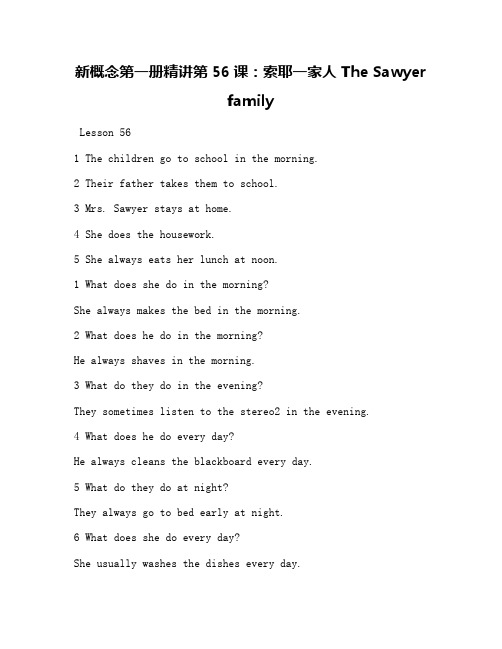
新概念第一册精讲第56课:索耶一家人 The SawyerfamilyLesson 561 The children go to school in the morning.2 Their father takes them to school.3 Mrs. Sawyer stays at home.4 She does the housework.5 She always eats her lunch at noon.1 What does she do in the morning?She always makes the bed in the morning.2 What does he do in the morning?He always shaves in the morning.3 What do they do in the evening?They sometimes listen to the stereo2 in the evening.4 What does he do every day?He always cleans the blackboard every day.5 What do they do at night?They always go to bed early at night.6 What does she do every day?She usually washes the dishes every day.7 What do they do in the afternoon?They usually type some letters in the afternoon.8 What does it do every day?It usually drinks some milk every day.9 What do they do in the evening?They sometimes watch television in the evening.10 What does she do at noon?She always eats her lunch at noon.11 What does he do in the evening?He often reads his newspaper in the evening.课堂笔记Lesson 55 The Sawyer family新单词:live、stay、home、housework、lunch、afternoon、usually、together、evening、arrive、nightlive:长期居住在…;短期住dwell3:合法居住inhabit:世世代代居住在…reside:(正式用语)居住在…live in/live atMy uncle lives in Paris.The Sawyers live at 87 King Street.Where do they live?/ Where does she(he) live?Live (a.) live show:现场演出make a live:谋生live for:为……而活者homeless:无家可归homesick4:思乡的hometown:家乡homely5:家常的homeland:祖国homemade:自制的home alone:独自在家(小鬼当家)地点副词:here,there,home,upstairs,downstairs,downtown,abroad这些地点副词前面不能加介词do one's houseworkdo the houseworkbreakfast:早餐lunch:午餐supper:晚餐dinner:正餐,宴会meal:一顿饭 three meals a dayin the afternoonin the eveningat nightarrive in/atgo to work:去上班go to school:去上学take sb. to somewhere:带某人去……see one's friends:拜访……的朋友drink tea together:一起喝茶come home from school:从学校回家come home from work:下班回家arrive home:到家live at, go to work, go to school, take to, stay at home, do the housework, eat one's lunch, see one's friends, drink tea togher, come home from school, arrive home, come home from work, do one's homework, go to bed, read one's paper, wathe TVThe Sawyers live at 87 King Street.In the morning, Mr. Sawyer goes to work and the children go to school.Their father takes them to school every day.Mrs. Sawyer stays at home every day.She does the housework.She always eats her lunch at noon.In the afternoon, she always sees her friends.They often drink tea together.In the evening, the children come home from school.They arrive home early.Mrs. Sawyer comes home from work.He arrives home late.At night, the children always do their homework.Then go to bed.Mr. Sawyer usually reads his newspaper, but sometimes he and his wife watch television.by――表示某种方式by car/bus/trainThey go to school by car every day.They are going to school by bus today.on footThe children are going to school on foot.at+时间The children come home from school at 5 every day.。
新概念英语第一册-55-56课课件

学习英语常用表达
详细描述
Text B包含了一些英语常用表达和句型,通过学习这些表达和句型,学生可以更好地掌握英语口语和写作技巧,提高英语应用能力。
Text B
了解英国教育体系
总结词
Text C介绍了英国的教育体系,包括小学、中学和大学的教育体制、课程设置和教学方式等,旨在帮助学生更好地了解英国的教育情况。
Vocabulary exercises
Multiple choice: Choose the correct meaning of a given word from a list of choices.
Vocabulary exercises
Lesson 56 Vocabulary Exercises
Reading exercises
Writing Practice
07
Writing guidance
Introduction
Task Description
Example
Assessment Criteria
Provide a brief overview of the writing task and its importance.
This tense is used to talk about an action that started in the past and is still continuing in the present. It is formed by using "have been" + -ing form of the verb.
提高听、说、读、写能力
本课程注重全面提高学生的英语能力,通过大量的听力、口语、阅读和写作练习,帮助学生提高英语的实际应用能力。
新概念英语第一册Lesson_55&56精品课件!

In the evening, do the children arrive home early? Yes, they do. How about Mr. Sawyer? He arrives home late. At night, what does Mr. Sawyer usually do? What does he sometimes do with his wife? Mr. Sawyer usually reads his newspaper. Sometimes he and his wife watch television.
新概念英语一册
教师:姜老师
Teaching objectives!
Lesson 55 & 56
1
一般现在时态
talk about one's day
2 3 4
频率副词的使用
learn the story and retell
• Let’s read and remember the new words:
• Let’s read and remember the new words:
• • live 住、 生活 usually 通常 stay 呆在、停留 together 一起
•
•
home 家
housework 家务
evening 晚上
arrive 到达
•
•
lunch 午饭
afternoon 下午
They, always, watch
They always watch TV at night.
What does Jack often do in the evening?
新概念英语1Lesson56

Lesson 5 Nice to meet you!Lesson6 What make is it?Keywords:1.★Mr. 先生加在男性的姓氏前面Mrs. 夫人(已婚的)(随夫姓)Ms. 女士(不表明婚姻状况)Mr. / Mrs. / Miss后面只能加姓或者全名,不能直接加名字。
John Blake,可以称呼为Mr. Blake或Mr. John Blake,但是不能说Mr. John。
2.★ makeV 制造,做He is making a cake.N. (产品的)牌子,型号,类型What make is it?3.★国名和某国人(详细见后表)China – Chinese America – American England – English4.★ This is Miss Sophie Dupont.This is …… 这是……介绍物品或者人注意:介绍人是有顺序的,一般是先年长后年轻,先上级后下级,先女士后男士。
外国人的姓名一般有三个部分: First name + Middle name + Last nameGiven name + Middle name + Family name对照:中国人是姓在前名在后,外国人是名在前姓在后。
5. Nice to meet you.用于初次相识或被人介绍时打招呼回答:Nice to meet you, too. 也可以说Me, too.类似的表达,例如Glad/happy/pleased to meet/see you.正式的说法是:-How do you do? -How do you do?6. Sophie is a new student.冠词a/an用在单数可数名词之前,表泛指,尤其是第一次出现时。
a 用于元音因素前,an 用于辅音因素前。
注意的字母:h/u 词:an hour a house an umbrella a university语法1.★冠词: 定冠词和不定冠词a,an是不定冠词,一个(1)a/an有不确定的意义(即所说的人、动物或东西对听者或读者来说可能是不知道的)。
新概念第一册精讲第56课:索耶一家人TheSawyerfamily
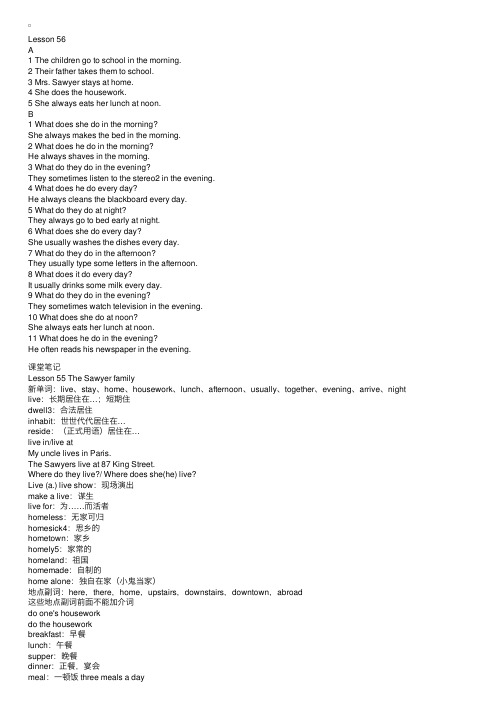
Lesson 56A1 The children go to school in the morning.2 Their father takes them to school.3 Mrs. Sawyer stays at home.4 She does the housework.5 She always eats her lunch at noon.B1 What does she do in the morning?She always makes the bed in the morning.2 What does he do in the morning?He always shaves in the morning.3 What do they do in the evening?They sometimes listen to the stereo2 in the evening.4 What does he do every day?He always cleans the blackboard every day.5 What do they do at night?They always go to bed early at night.6 What does she do every day?She usually washes the dishes every day.7 What do they do in the afternoon?They usually type some letters in the afternoon.8 What does it do every day?It usually drinks some milk every day.9 What do they do in the evening?They sometimes watch television in the evening.10 What does she do at noon?She always eats her lunch at noon.11 What does he do in the evening?He often reads his newspaper in the evening.课堂笔记Lesson 55 The Sawyer family新单词:live、stay、home、housework、lunch、afternoon、usually、together、evening、arrive、night live:长期居住在…;短期住dwell3:合法居住inhabit:世世代代居住在…reside:(正式⽤语)居住在…live in/live atMy uncle lives in Paris.The Sawyers live at 87 King Street.Where do they live?/ Where does she(he) live?Live (a.) live show:现场演出make a live:谋⽣live for:为……⽽活者homeless:⽆家可归homesick4:思乡的hometown:家乡homely5:家常的homeland:祖国homemade:⾃制的home alone:独⾃在家(⼩⿁当家)地点副词:here,there,home,upstairs,downstairs,downtown,abroad这些地点副词前⾯不能加介词do one's houseworkdo the houseworkbreakfast:早餐lunch:午餐supper:晚餐dinner:正餐,宴会meal:⼀顿饭 three meals a dayin the afternoonin the eveningat nightarrive in/atgo to work:去上班go to school:去上学take sb. to somewhere:带某⼈去……see one's friends:拜访……的朋友drink tea together:⼀起喝茶come home from school:从学校回家come home from work:下班回家arrive home:到家live at, go to work, go to school, take to, stay at home, do the housework, eat one's lunch, see one's friends, drink tea togher, come home from school, arrive home, come home from work, do one's homework, go to bed, read one's paper, wathe TV The Sawyers live at 87 King Street.In the morning, Mr. Sawyer goes to work and the children go to school.Their father takes them to school every day.Mrs. Sawyer stays at home every day.She does the housework.She always eats her lunch at noon.In the afternoon, she always sees her friends.They often drink tea together.In the evening, the children come home from school.They arrive home early.Mrs. Sawyer comes home from work.He arrives home late.At night, the children always do their homework.Then go to bed.Mr. Sawyer usually reads his newspaper, but sometimes he and his wife watch television.by――表⽰某种⽅式by car/bus/trainThey go to school by car every day.They are going to school by bus today.on footThe children are going to school on foot.at+时间The children come home from school at 5 every day.。
- 1、下载文档前请自行甄别文档内容的完整性,平台不提供额外的编辑、内容补充、找答案等附加服务。
- 2、"仅部分预览"的文档,不可在线预览部分如存在完整性等问题,可反馈申请退款(可完整预览的文档不适用该条件!)。
- 3、如文档侵犯您的权益,请联系客服反馈,我们会尽快为您处理(人工客服工作时间:9:00-18:30)。
Mini
迷你
句型操练:
What make is it?
它是什么牌子的?
It’s a Volvo. (Swedi1) n. (产品的)牌号 • My shirt is a Korean make. • What make is your watch? • What make is your car? • 2)v 制作 make a car Make a dish
• ticket
n.
• number
n.
• sorry
adj
• sir
n.
cloakroom n.
•伞 •请 • 这里 •票 • 号码 • 对不起的 • 先生 • 衣帽间
练一练
1. Excuse B____ ! Is this your hamdbag?
A. you B. me C. it D. I
Be动词的缩写形式
• I am-I’m • I am not-I’m not • He/She/It is-He’s/She’s/It’s • He/She/It is not-He/She/It isn’t • We/You/They are-We’re/You’re/They’re
We/You/They are not- We/You/They aren’t
And this is Luming.
He’s _C_h_i_n_e_s_e__ .
“Nice to meet you .”
And this is Xiaohui . She’s Chinese ,
______. too
“Nice to meet you .”
我是哪国人?
• 在说自己是哪一个国家的人时,使用句型: I’m...... 例如:I'm Chinese.
Italian
意大利的
Fiat
菲亚特
German
德国的
Mercedes
梅赛德斯(奔驰)
Japanese
日本的
Toyota
丰田
French
法国的
Peugeot
标致
Korean
韩国的
Daewoo
大宇
Swedish
瑞典的
Volvo
沃尔沃
American
美国的
Ford
福特
English
英国的
• 用以下单词来做一个替换练习吧! Franch,German,Japanese,Korean, Italian,American,Swedish,English
练习
• 翻译下列句子 1. -- 这位是索菲亚小姐吗?-- 是的,我是一
名学生。我是法国人。我很高兴见到你。
--- Is this Miss Sophie? --- Yes, I am a student. I am French. Nice
Lesson 5
Nice to meet you.
复习 • 这是我的......
Here's my... • 这个不是我的......
This is not my... • 号码的表达方法
Number...
上一节课的单词
• umbrella n.
• please
int.
• here adv.
见到你很高兴!
Nice to meet you .
And _t_h_is__is__Naoko.
She is Japanese. “N__ic_e__to__m_e_e_t__y_o_u .”
And this is Chang-woo. He’s _K_o_r_e_a_n__.
“ N__ic_e__to__m__e_e_t _y_o-u.”
Mr.
French
nice
China
meet
根据英语说汉语
Japanese
Korean
German
中国人
日本人
早上好
德国人
学生
法国人
美好的
韩国人
根据汉语说出英 语
New words
• Mr. ['mistə] 先生 • good [gud] adj.好 • morning ['mɔ:niŋ] n.早晨 • Miss [mis] 小姐 • new [nju:] adj.新的 • student ['stju:dənt] n.学生 • French [frentʃ] adj.& n.法国人
C. Thank you very much!
D. Nice to meet you.
单词讲解
• Mr. ['mistə] 先生
Mr.用于男士的姓之前,不能单独使用,如课文 中的 Mr.Blake;而sir 一般单独使用,是对长者、 上司或男顾客的尊称,如:Sorry, sir. 对不起, 先生。
如何询问国籍呢?
• What nationality is she /he ? • She’s French/Chinese/German/Korean • He’s …. • What is your nationality ? • I am American / Italian / English .
• Miss [mis] 小姐 一般用于指未婚女子,不过有时在不知道 对方是否已婚时也可使用
• Good morning. 早上好 那么下午好和晚上好还记得怎么说吗?
Good afternoon. Good evening. 再见 晚安 good bye 祝你好运good night
good luck
nice ['nais] adj.美好的
• ① adj. 美好的,好看的 It’s a nice day today, isn’t it? That's a nice shirt.
• ② adj. 和蔼的,友好的 He is very nice to his neighbours.
• ③ adj. 使人高兴的,令人愉快的 It is so nice to have you here.
Chinese [tʃai'ni:z] 中国的;中国人
French [frentʃ] 法国的;法国人
German ['dʒə:mən] 德国的;德国人
Japanese [dʒæpə'ni:z] 日本的;日本人
Korean [kə'riən] 韩国的,韩国人
Swedish ['swi:diʃ] 瑞典的;瑞典人
Nice to meet you!
• 在初次见面时可以说这句话,回答是: Nice to meet you,too.
• 在初次见面时还可以说: How do you do. 回答也是 How do you do.
new [nju:] adj.新的
• 相关词组 New Year 新年
•
news 新闻(不可数名词)
Peugeot
•
a piece of news 一条新闻
too [tu:] adv.也 ,又,还
• 用法:一般放于肯定句末,表示“也” eg: I have the English book,too. I know the answer,too. 放在形容词的前面表示 太;过于: eg: The hat is too big. 帽子太大。 Summer is too hot. 夏天太热了。 That's too bad. 那太糟糕了。
三. Text Appreciation:
Good morning !
Good morning , Mr. Blake .
This is Miss Sophie Dupont .
Sophie is a new _s_tu_d_e_n_t_ . _S_h_e__is French
Sophie , This is Hans . He is German.
to me you 2. -- 那位是直子小姐。-- 她是日本人吗?--
是的,她也是一名新学生。
--- That is Miss Naoko. --- Is she a Japanese? --- Yes,( she is). She is a new student.
Lesson6
What make is it
一. Listen to the tape ,then answer this question “Is Chang-woo Chinese?”
不定冠词a
• 冠词数量上表示“一个”。冠词一共有 三个,分为不定冠词(a,an)和定冠 词(the)。
• 可数名词单数前面必须要用不定冠词。 a用在以辅音音素开头的名词前面 an 用于以元音开头的名词前面 例如:a pen an apple an umbrella an egg an hour a shirt
• German ['dʒə:mən] adj.& n.德国人 • nice ['nais] adj.美好的 • meet [mi:t] v.遇见 • Japanese [dʒæpə'ni:z] adj.& n.日本人 • Korean [kə'riən] adj.& n.韩国人 • Chinese [tʃai'ni:z] adj.& n.中国人 • too [tu:] adv.也
2. --Is this your umbrella? -- No, it D____ .
A. is B. not is C. my D. isn’t
3. – What is your name? –Pardon? --_A____
A. What is your name?
